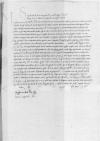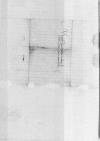List #228
Sigismund I Jagiellon & Bona Sforza do Ioannes DANTISCUSCracow, 1525-03-13
Rękopiśmienne podstawy źródłowe:
Pomocnicze podstawy źródłowe:
Publikacje:
| ||||||||||||||||||||||||||||||
Tekst + aparat krytyczny + komentarzZwykły tekstTekst + komentarzTekst + aparat krytyczny
Magnifico
Magnifice sincere nobis dilecte.
Post eam exspectationem, quae non sine quadam molestia esse potuit, in reditu venerabilis
Attulit doctor
Sumptum vero tibi suppeditandum provideri faciemus, ne inopia premente dignitati nostrae aliqua in re deesse videri possis, quem in defectu a nummulariis de more accipies, donec quod mittendum est, afferatur. In reliquis, quae accidere possunt, sic te geres eaque dexteritate uteris, ut res ipsas nostras fideliter et diligenter curans gratiam nostram promerearis, quae tibi non deerit pro ratione et modo obsequiorum tuorum.
Dat(ae) or Dat(um)⌈Dat(ae)Dat(ae) or Dat(um)⌉


 BNW, BOZ, 953, f. 55v
BNW, BOZ, 953, f. 55v